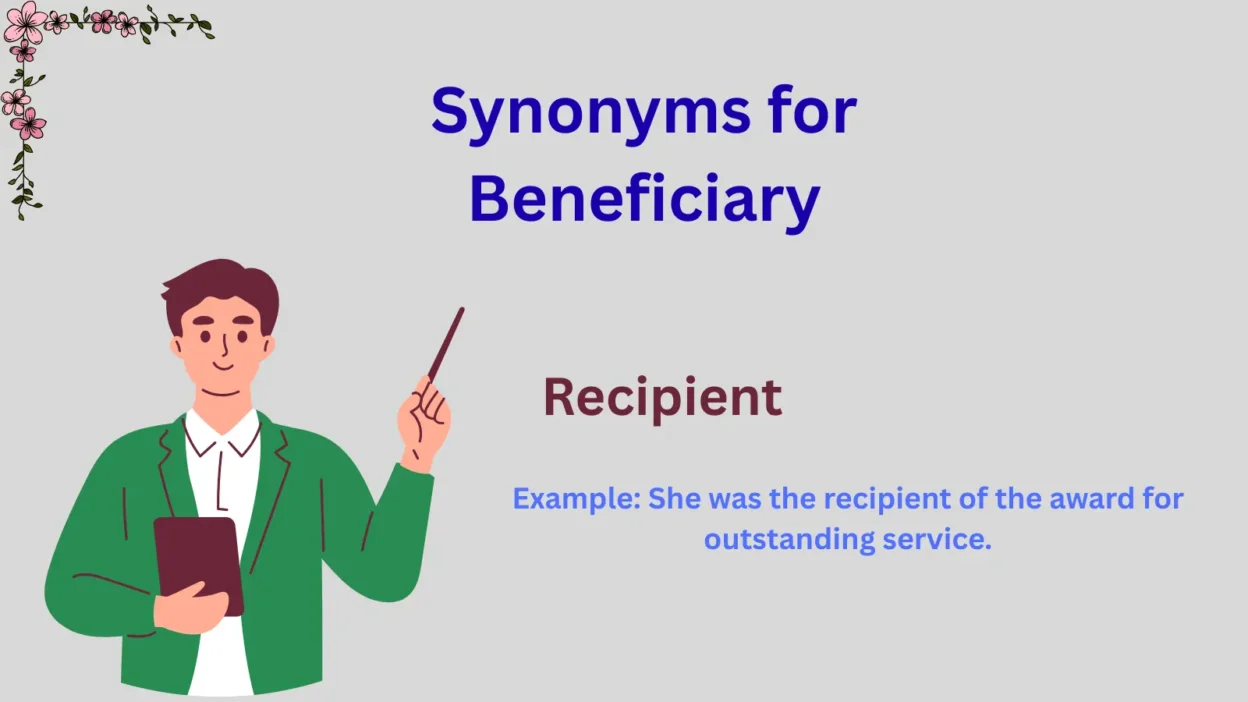Synonyms for Beneficiary can help you describe a person or group that receives an advantage, gift, or entitlement in different ways. The word beneficiary is commonly used in contexts like insurance policies, wills, trusts, or charitable donations, where someone is officially designated to receive benefits.
However, relying only on the beneficiary may limit how you express the idea. Alternatives such as recipient, heir, legatee, or grantee provide variety and nuance, depending on whether the situation is legal, financial, or everyday.
In this article, we’ll explore a wide range of synonyms for beneficiary, explain their subtle differences, and give clear examples to help you choose the right term for any context.
What Does “Beneficiary” Mean?
A beneficiary is someone who receives benefits, advantages, profits, or rights from another person, organization, or situation.
- In legal and financial contexts, a beneficiary is often the person named to receive money, property, or insurance after someone’s death.
- In charitable contexts, a beneficiary is the person or group supported by a donation or program.
- In general use, it can simply mean anyone who gains from an act, event, or decision.
Because the word carries both technical and human-centered tones, choosing the right synonym depends on the setting.
Synonyms for Beneficiary (With Examples & Usage)
1. Recipient
Meaning: Someone who receives something, often in a neutral or formal tone.
Example: She was the recipient of the award for outstanding service.
When to Use: Good for general or formal contexts without legal implications.
2. Heir
Meaning: Someone legally entitled to inherit property, money, or a title.
Example: As the eldest son, he became the sole heir to the estate.
When to Use: Best in family or inheritance contexts; strong legal and traditional connotations.
3. Inheritor
Meaning: A person who receives property or rights through succession.
Example: The inheritor of the land chose to donate it to conservation.
When to Use: More formal than “heir,” often used in wills and property transfers.
4. Legatee
Meaning: Someone who receives a legacy (gift of property or money) in a will.
Example: The will named her as the primary legatee of the family fortune.
When to Use: Strictly legal; ideal for precise legal writing.
5. Successor
Meaning: A person who follows another in position, office, or ownership.
Example: The company’s successor took over the leadership role smoothly.
When to Use: Common in business, leadership, or inheritance of roles.
6. Grantee
Meaning: A person to whom something is granted, such as property rights.
Example: The grantee of the land signed the deed immediately.
When to Use: Legal and contractual settings, especially in property law.
7. Donee
Meaning: Someone who receives a gift or donation.
Example: The scholarship fund’s donee expressed deep gratitude.
When to Use: Charitable or philanthropic contexts.
8. Awardee
Meaning: A person granted an award, scholarship, or honor.
Example: The awardee thanked the committee for the recognition.
When to Use: Educational, professional, or ceremonial contexts.
9. Allottee
Meaning: Someone to whom an allotment of shares or property is given.
Example: Each allottee received 100 shares in the new company.
When to Use: Business and finance contexts, especially with shares.
10. Assignee
Meaning: A person to whom rights or property are legally transferred.
Example: The patent was handed to the assignee for development.
When to Use: Legal contracts, intellectual property, and finance.
11. Nominee
Meaning: A person officially chosen to receive rights or recognition.
Example: The nominee of the insurance policy will receive the payout.
When to Use: Insurance, awards, or formal selections.
12. Appointee
Meaning: Someone assigned to a position or role.
Example: The appointee assumed office after the swearing-in ceremony.
When to Use: Business, government, or organizational contexts.
13. Designee
Meaning: A person designated for a duty, role, or right.
Example: The designee will act in the absence of the chairperson.
When to Use: Formal writing; similar to “appointee” but more official.
14. Grantee of Trust
Meaning: The person receiving benefits from a trust fund.
Example: The grantee of trust received quarterly payments.
When to Use: Legal and financial trust arrangements.
15. Benefactor’s Protégé
Meaning: Someone mentored or supported by a benefactor.
Example: The artist was a protégé of a wealthy patron.
When to Use: Cultural, artistic, or mentorship settings.
16. Benefited Party
Meaning: The person or group who gains from an agreement or event.
Example: The benefited party signed the settlement agreement.
When to Use: Legal and business contracts.
17. Devisee
Meaning: A person who inherits real estate in a will.
Example: The family home went to the eldest daughter as the devisee.
When to Use: A Technical legal term for real estate inheritance.
18. Distributee
Meaning: Someone entitled to receive property from an estate.
Example: Each distributee received their fair portion of the estate.
When to Use: Probate law and estate distribution.
19. Pensioner
Meaning: Someone receiving financial benefits from retirement funds.
Example: The pensioner depended on monthly payments for living expenses.
When to Use: Social welfare, retirement, or government contexts.
20. Insured
Meaning: The person entitled to benefits under an insurance policy.
Example: The insured will be reimbursed for medical expenses.
When to Use: Insurance and financial documents.
21. Claimant
Meaning: A person claiming benefits or compensation.
Example: The claimant sought damages for the accident.
When to Use: Legal disputes, insurance, or financial claims.
22. Entitled Party
Meaning: Someone with legal or moral rights to benefits.
Example: The entitled party demanded their share of the inheritance.
When to Use: Legal contexts with a strong emphasis on rights.
23. Trustee’s Charge
Meaning: The person receiving benefits under a trustee’s management.
Example: The trustee’s charge was provided with funds for education.
When to Use: Trust and fiduciary arrangements.
24. End-User
Meaning: The ultimate consumer of a product or service.
Example: The end-user benefited from the company’s innovations.
When to Use: Business, technology, and product development.
25. Payee
Meaning: A person to whom money is paid.
Example: The check was issued to the payee listed on the invoice.
When to Use: Financial, banking, and transactional contexts.
26. Holder
Meaning: Someone in possession of rights, property, or securities.
Example: The bondholder received annual interest payments.
When to Use: Finance, banking, and securities.
27. Donee of Charity
Meaning: Someone supported by charitable donations.
Example: The donee of charity was provided with shelter and food.
When to Use: Nonprofits, humanitarian aid, and philanthropy.
28. Ward
Meaning: A person under the care of a guardian or institution.
Example: The orphan became a ward of the state.
When to Use: Legal guardianship, child welfare, and social care.
29. Protege
Meaning: Someone guided and supported by a mentor.
Example: Her protégé grew into a successful lawyer under her guidance.
When to Use: Educational, professional, or mentorship relationships.
30. Receiver
Meaning: The person or entity that accepts or collects benefits.
Example: The receiver of the funds distributed them fairly.
When to Use: General, neutral alternative for everyday or formal contexts.
How to Choose the Right Synonym
- Legal or Financial Settings: Use precise terms like legatee, devisee, distributee, payee, assignee.
- Charitable or Humanitarian Settings: Choose the donee, recipient, ward, or beneficiary of charity.
- Business or Corporate Settings: Go with end-user, allottee, holder, or appointee.
- Personal and Emotional Writing: Use heir, protégé, inheritor, successor.
The emotional tone matters too:
- Formal/Neutral: Recipient, designee, grantee.
- Warm/Humanized: Protégé, ward, donee.
- Strictly Legal: Legatee, devisee, distributee.
Conclusion
Understanding and using synonyms for beneficiary allows you to communicate with more precision, especially in legal, financial, or professional contexts. While beneficiary is the standard term in insurance, wills, and trusts, alternatives like recipient, heir, legatee, or grantee help tailor your language to the situation.
By choosing the right synonym, you avoid repetition and ensure that your message is both accurate and clear.
In short, exploring synonyms for beneficiary not only strengthens your vocabulary but also gives you the flexibility to express complex ideas with clarity and confidence.




